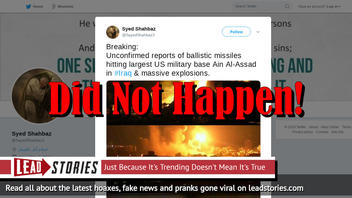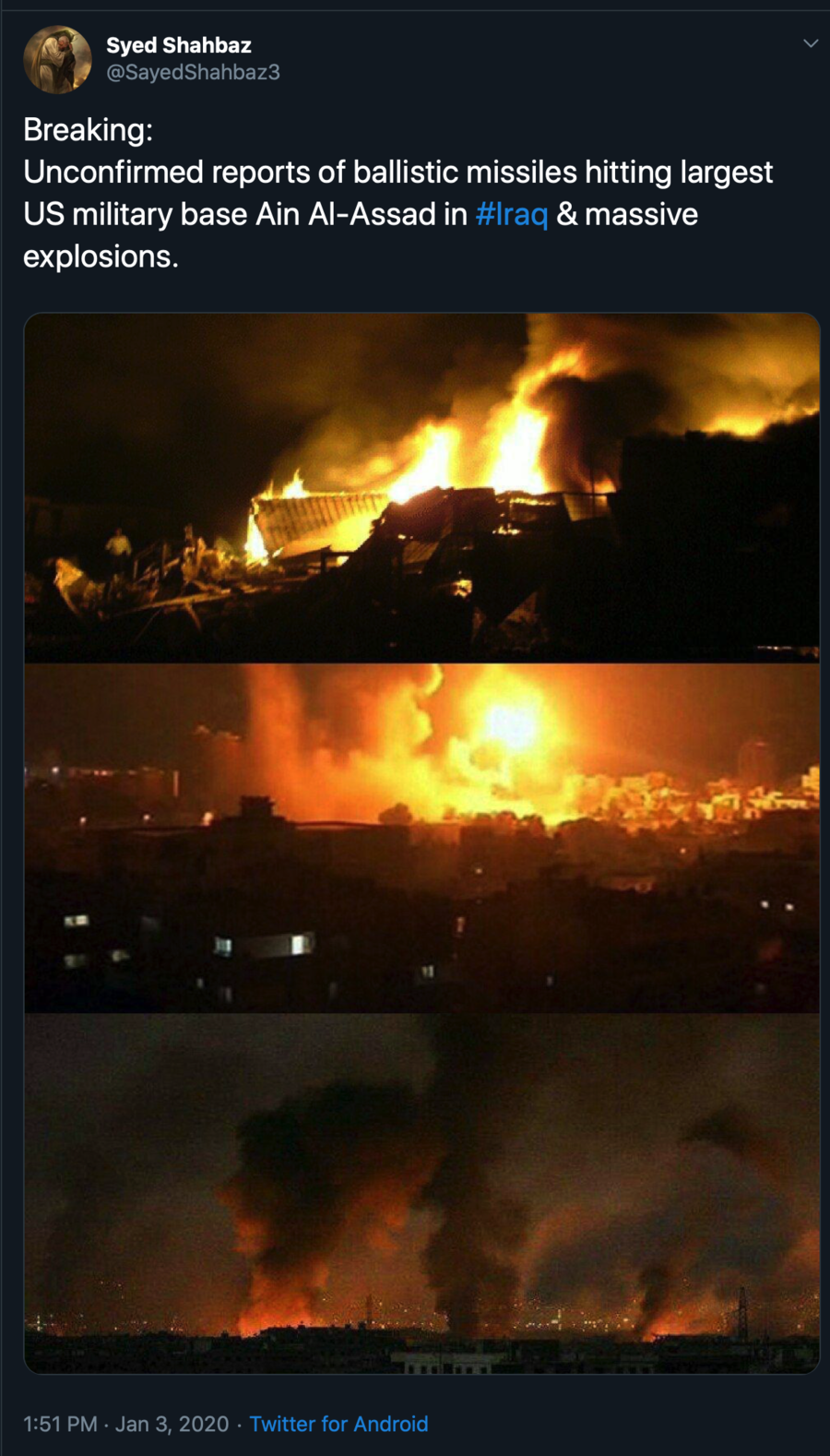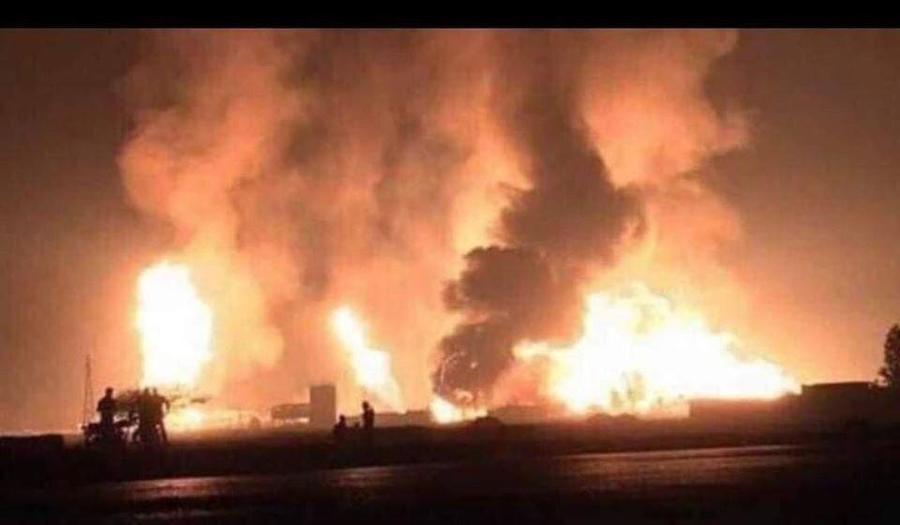STORY UPDATED: check for updates below.

UPDATE: Iran announced on January 7, 2020, that the country had attacked bases in Iraq where U.S. forces are stationed. This attack did not occur on January 3, 2020, as claimed in the fake story below. Iran said the attack was in retaliation for the killing by the U.S. of Maj. Gen. Qassem Soleimani, a top Revolutionary Guards commander.
UPDATE 2: It was reported on January 17, 2020, that 11 U.S. troops were indeed injured in the January 7 attacks.
------
Did Iranian ballistic missiles hit the largest U.S. military base in Iraq? No, that's not true: there was no strike on the U.S. and Iraqi airbase recently, and the images show the aftermath of explosions in different nations in past years. The supposed attack on January 3, 2020, never happened.
The tweets come less than a day after President Trump ordered the assassination of Maj. Gen. Qassem Soleimani, the head of the Iranian Quds Force. Iran vowed "forceful revenge" in retaliation for the airstrike.
The account originated on the Iranian news Mizan, citing Iranian Revolutionary Guard Corps chats on the encrypted messaging apps Telegram, according to tweets from Sina Toossi, an analyst from the National Iranian American Council.
Users on social media saw the following:
Breaking:
-- Syed Shahbaz (@SayedShahbaz3) January 3, 2020
Unconfirmed reports of ballistic missiles hitting largest US military base Ain Al-Assad in #Iraq & massive explosions. pic.twitter.com/O6WjWNzvRZ
Five rockets did land on the base in early December 2019, according to an Iraqi military statement reported by Reuters. But there is no evidence that they were "ballistic missiles," as is stated in the tweet, and there were no casualties as a result of the December incident.
#BREAKING: Iranian outlet Mehr reports massive explosions at the US Ain al-Assad military base in Iraq's Anbar province, which is the largest US military base in the country.
-- Sina Toossi (@SinaToossi) January 3, 2020
The report evidently originated from the Iranian Mizan outlet, connected with the judiciary. And then spread to other outelts. All citing an "unofficial" Iraqi source. Here's hoping it's fake news.
-- Sina Toossi (@SinaToossi) January 3, 2020
Breaking: Unconfirmed reports of ballistic missiles hitting largest US military base Ain Al-Assad in #Iraq & massive explosions, via IRGC Telegram channels.
-- Farnaz Fassihi (@farnazfassihi) January 3, 2020
Update: These reports of attacks on US base are not true according to Iraqi military officials. https://t.co/TBV26xxLcf
-- Farnaz Fassihi (@farnazfassihi) January 3, 2020
I just called the Iraqi army 7th division commander who is based there, he completely denied it
-- Mustafa Salim (@Mustafa_salimb) January 3, 2020
But before Fassihi could post the correction, a Twitter user under the name Syed Shahbaz copied and pasted the original tweet without the attribution and added a collage of three images, pictured here:
All three images in the collage are inaccurate. The first image in the collage was posted on the website of the People's Mojahedin Organization of Iran, a political-militant organization based on Islamic and Marxist ideology which advocates for the overthrow of the Iranian leadership. It shows a 2015 attack on Camp Liberty, also known as Camp Hurriya, which housed members of the organization on the outskirts of Baghdad.
"The United States strongly condemns today's brutal, senseless terrorist attack on Camp Hurriya that killed and injured camp residents," Secretary of State John Kerry said in a statement at the time.
The second and third images in the collage are cropped versions of images showing airstrikes attributed to Israel in Syria, not an Iranian airstrike on a U.S. airbase in Iraq.
Another Twitter user, under the handle @ahmid1192, tweeted another image at 12:46 p.m., allegedly of the attack:
#عاااااجل
-- المحامي ⚖️ (@ahmid1192) January 3, 2020
تعرض قاعدة عين الاسد الى هجوم صاروخي عنيف جدا وانباء تتحدث عن استهدافها بصواريخ باليستية مجهولة المصدر ..؟ pic.twitter.com/Cj3ArRznIN
Ain Al-Asad base was subjected to a very violent missile attack and reports that it was targeting unknown source ballistic missiles ..?
We wrote about twitter.com before, here are our most recent articles that mention the site:
- Fake News: Video: Biden Did NOT Proclaim the 'European' Identity of America
- Fake News: Nancy Pelosi Did NOT Say 'We Have Been Working On Impeachment For The Past 2 1/2 Years'
- Fake News: Eagle Did NOT Land On Native American At College Football Game
- Fake News: Trump Did NOT Play Golf During U.S. Embassy Siege In Baghdad
- Fake News: Republican IS Offered As A Choice In California's 2020 Presidential Primary, But Only For Republicans
Updates:
-
2020-01-07T23:59:35Z 2020-01-07T23:59:35Z Update: Iran announced on January 7, 2020, that the country had attacked bases in Iraq where U.S. forces are stationed. This attack did not occur on January 3, 2020, as claimed in the fake story.














